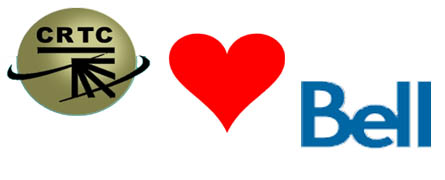Bell Permitted to Continue Throttling… For Now

The CRTC today announced its oft-delayed ruling in the CAIP application to put an end to Bell’s internet throttling practices. From the horse’s mouth:
“The Canadian Radio-television and Telecommunications Commission (CRTC) today announced that it has denied the Canadian Association of Internet Providers’ (CAIP) request that Bell Canada cease the traffic-shaping practices it has adopted for its wholesale Gateway Access Service…”
“Based on the evidence before us, we found that the measures employed by Bell Canada to manage its network were not discriminatory,” said CRTC chair Konrad von Finckenstein in a release. “Bell Canada applied the same traffic-shaping practices to wholesale customers as it did to its own retail customers…” [CRTC Ruling]
Though Bell may be applying the same practices on it’s own retail customers, I find the lack of discrimination claim somewhat dubious. The crux of the matter is the much maligned bit torrent (P2P) traffic, with Bell and other big providers in Canada and abroad claiming that it’s crushing their traffic, and needs to be slowed down. However, all reports, including Bell’s own data along with data provided by 3rd parties all reveal that bit torrent s not the bandwidth hog that the telco claims.
Email, web streaming and online gaming each take up more bandwidth than bit torrent, and both web streaming and online gaming are major growth areas in online traffic. Similarly, the VERY MINOR congestion Bell has claimed would be easily remedied by its announced upgrade budget.
“Whether it’s throttling the internet, imposing unfair text message fees or price gouging on cell-phone rates, it seems Canadian telcos can count on the backing of this government… [The] CRTC is applying outdated rules that this government has refused to change, leaving the average consumer and emerging business models at the mercy of the telecom giants.” – NDP MP Charlie Angus
One could reasonably suspect that Bell is opting to penalize P2P to make space for its own online video download/streaming service. One also has to wonder what data the CRTC was looking at when making its ruling.
What makes this ruling even more frustrating for 3rd party wholesalers and THEIR customers is Bell’s continued blocking of alternate infrastructure, to maintain its control of the Canadian DSL space. TekSavvy and other wholesalers have repeatedly tried to build out their own infrastructure to get out from under Bell’s control, but is repeatedly blocked.
Some in the press are saying that there’s a silver lining in this cloud hanging over net neutrality in Canada. The CRTC will be looking at the larger picture in the summer of 2009. I see little reason to be so optimistic on the issue as Canada continues to slip deeper into the pits of internet access, when it comes to both pricing and speed.




Good post! I agree that it is overoptimistic to say there is a silver-lining here. The CRTC is just trying to soften public response by making it appear that they didn’t decide what they just decided. The third party resellers don’t even resell access to Bell’s own network — they just use the ‘last mile’ extending from the local DSLAM to the customer’s home. Bell is throttling that last mile on the theory that it is slowing their central network — that makes no sense, is belied by the data as you point out, and for some reason the CRTC is swallowing this garbage on the theory that ‘Bell is throttling their own customers too, so they are not being unfair.’ Okay, so, great, if McDonald’s decides to put pounds more saturated fat in their burgers, does that give them the right to walk over to Burger King’s kitchens and put some extra fat in their burger’s, too? What if Burger King were renting space on McDonald’s trucks — would that give McDonald’s the right to start poking hypodermic needles full of fat into BK’s frozen patties on the truck? Because that’s essentially what Bell is doing here. The ‘resellers’ do NOT use Bell’s backbone. Bell is just renting them copper wire that actually leads to your house, but they are snooping the packets on their way and favouring some sorts of traffic over others, when Bell has no responsibility for either the backbone network that the traffic is coming from, nor the customer that it is going to. That’s just scrotal and the network management arguments hold no water.
[…] we’ve covered many times in the past, Bell has continued to put a stranglehold on innovation in Canada’s […]